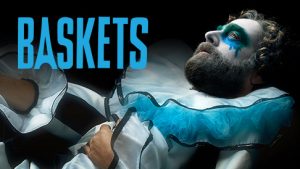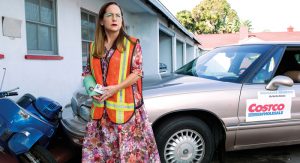There is no doubt that American society has become – and is still becoming – more equal. Specifically, the most progress has been made concerning issues of race, gender, and sexuality. And we can see real results of this in politics, such as the presidency of Barack Obama, the candidacy of Hillary Clinton, and legalization of gay marriage, respectively. But many Americans just don’t care about politics. This past week in New York City, just 22% of registered voters bothered to show up to the polls (Smith). Therefore, to better investigate the effects of changing equality and to decipher the true politics of the people, we should turn to the things that people actually like. That is, we need to look at popular culture and entertainment, for everyone enjoys doing activities such as listening to music and watching TV or movies (at least on some level).
But since mass culture is such a vast structure, for this essay I would like to focus in on one aspect of it: TV comedies. So what can TV comedies tell us about our culture? Well, right off the bat, it would appear that TV comedies have followed the increase in equality. Shows like Friends and Full House that feature exclusively white characters living joyfully in the capitalist system have become less frequent. In their place, more diverse shows have cropped up like Blackish and Modern Family. With that being said, there is another facet of America’s changing equality that I’ve neglected to point out; while social norms have improved, income equality has digressed. We often hear the term: “the rich are getting richer.” Consequently, a new populism has arisen in the form of groups like the Bernie Sanders crew. So what kind of an impact does this change have on our culture? To consider this question, let’s inspect the TV comedy Baskets.

Baskets has an oddly satisfying humor despite its frequent sadism. It stars Zach Galifianakis (who also co-created the show with Louis C.K. and Jonathan Krisel and is an executive producer) as Chip Baskets, a free-spirit who’s dream is to be a clown. Initially Chip goes to France in order to be trained as a clown. This of course goes downhill as he has little money and cannot speak French. So Chip returns to his native Bakersfield, CA, and his struggles continue. He becomes a rodeo clown at a local rodeo arena, which consists of him being gored by bulls. However at the end of Season 1 the rodeo shuts down, leaving Chip completely lost. In essence, Chip does not fit into the capitalist society. His desire to be a clown is removed enough from the norms of the system that it’s extremely difficult for him to be free. Furthermore, the consequences of Chip’s quest to be a clown generate strong Utopian elements in the show.
Now, before we jump into Baskets, I want to discuss what I take to be a fair analysis of how art and entertainment operate. The idea comes from a cultural theorist by the name of Fredric Jameson in an essay titled “Reification and Utopia in Mass Culture.” Jameson does a fantastic job of assimilating the theory of Adorno, who believed that mass culture is manufactured to reproduce the ruling ideology of the capitalist system in the minds of consumers, and the theories of thinkers such as Bakhtin, who put forth that mass culture gives people an image of transcendence and brings out their yearning for a more equitable and Utopian society. He basically melds the two theories together and asserts that they both exist together, and that we must consider both aspects to get the best picture of culture: “Works of mass culture cannot be ideological without at one and the same time being implicitly or explicitly Utopian as well: they cannot manipulate unless they offer some genuine shred of content as a fantasy bribe to the public” (Reification 144). This takes on an Adornian stance as Jameson contends that the Utopian element often supports the manipulative/ideological element by fooling the audience even further by giving them hope, while actively subverting that hope as their places in society is cemented. Nevertheless, the idea that there is a continuing dialectic between the two aspects appears to be more accurate than considering a cultural item to be solely ideological, or solely Utopian. And taking this idea, I am inclined to chime in that although these two aspects coexist, there still is a spectrum wherefore every type of artwork will have one aspect more prevalent over the other (or maybe they could be in equal form). For example, Jameson thinks that art in mass culture is influenced more heavily by ideology, in fact he asserts that ideology dominates the Utopian element and puts it to use for its own purposes. But one could also think of a scenario where a work of art is characterized more strongly by its Utopian element. And such a scenario manifests itself in Baskets.

To start this analysis of Baskets, I want to consider Chip’s mom Christine Baskets, played by Louie Anderson who, to be a little blunt, is a heavy-set old man. One particularly Utopian episode is Season 2 Episode 4: “Ronald Reagan Library.” After the rodeo closes down (among other things), Chip is devastated, so he becomes a hobo and starts riding the rails. Eventually, he joins a crew of transients who end up getting arrested for trespassing. So Christine has to come and bail Chip out of jail. Okay, so, in the jail’s waiting room, she happens to hit it off with the father of one of Chip’s hobo friends. And this man, named Ken, happens to be an elderly black man. So the scene is already surprising in its embrace of freedom and equality, where we have an obese white woman (played by a man) flirting with an elderly black man. To make things more entertaining, Christine invites Ken to tour the Ronald Reagan Library, because of course Christine is a huge Reagan fan. Thus, not only are gender, age, race, and body image norms overturned, but the framework of political stance is also thrown out the window. In this instance the Utopian vision comes from the fact that it is conceivable and even normal to the audience that something like this would happen, and that it’s a good thing. It also exemplifies the shift in equality that America has experienced, for something of this nature would have been alien a few decades ago.
Often a Utopian ideal will include some aspect of anarchy; a situation where there are no rules or laws. Now, humans do not always do what is best for themselves and their communities, so anarchy can become destructive. Baskets is quick to snuff out this scenario as an element of its Utopianism. To see why, let’s dive deeper into what transpires when Chip joins the band of hobos. In short summary, Chip is initially overjoyed to have found some like-minded friends. These people turn out to share a love for performance with Chip; they each have some schtick that they perform for audiences on the street. But the joy starts to melt when Chip, along with the viewer, begins to realize that the other hobos are doing bad things. They shoplift. They trespass. This culminates when the group breaks into an empty house for a night. The members go straight to the drug cabinet and start shooting up substances and pop random pills. During this whole process, Chip is utterly frightened and the viewer gets the same feeling, the feeling of shock and stomach-dropping fear when something good turns sour. In this way, the viewer is made very uncomfortable about the idea of complete anarchy. Therefore, the Utopian aspect of Baskets is not meant to feature a dangerous sort of anarchy, but rather a type of warm freedom of equality and what we will see next as a freedom from the banality of a capitalist society.

What I want to close this study of Baskets with is an examination of how the show views our society. As I mentioned earlier, income inequality is very high here in the U.S, and while America is the land of opportunity, life isn’t fun and great for everyone. We will see that Baskets plays off of this fact. First off, there are two characters that indicate the show’s stance towards capitalism. There is Chip’s friend Martha, who has one of the most boring and trivial jobs one could conjure up: she works in the insurance division of Costco. Additionally, Martha comes across as an extremely boring person; she has a monotone voice and doesn’t do a whole lot in general. She’s just your average robotic cubicle worker. And then there is Chip’s twin brother Dale (yes Zach Galifianakis plays both roles, and yes they are named after the Disney chipmunks). Dale is the “dean” of Baskets Career College (probably not accredited) which offers classes in various disciplines such as ice cream truck management and ketchup kreation; and Dale himself actually was a student at his own college where he earned a degree in college management. So just think of it as a slightly worse Trump University. This spoofing of small businesses further parodies capitalism. Dale is also a very materialistic person, gaining pleasure from consumable goods. He also is in the middle of a divorce with his wife, and his kids are not fond of him. But the biggest break from capitalism comes in the final episode of Season 2. Christine’s mother passes away and wills all of her property, including her house, to Christine. She then proceeds to sell the house and purchase an Arby’s, because at this point Chip is working random birthday parties as a clown and Dale actually loses administrative control of his business, so both boys are in need of jobs. So she undertakes this new business operation in the hopes of bringing her family together. But she soon realizes that Chip is very depressed, for he has no opportunities to be a clown. Thus, she takes the initiative and sells the Arby’s franchise. She then proceeds to buy the old rodeo arena. In other words, Chip can finally live out his dream of being a clown on his own terms – he won’t have to be trampled by bulls or humiliated by 10-year olds any longer. On a deeper level though, Christine’s decision is a rebuke of corporatism (through the symbol of Arby’s) and the banality of that culture. Instead she chooses the happiness of her son, a happiness that could not readily be satisfied by capitalist society. These examples are all facets of Baskets’ Utopianism, for they aren’t satisfied with present condition, and want something more out of society and life. They also coincide with modern populism and disenchantment with the staggering wealth gap in America.
Generally, given the evidence, Baskets is heavily Utopian. There is of course the accompanying ideological element, for Baskets is a for-profit show produced by a firm in the culture industry and it’s setting is within the capitalist system. And surely one could argue that there are aspects of Baskets that reinforce societal norms and the power of the ruling ideology. I am of the impression however, that Baskets has enough pro-equality, anti-capitalist, and other Utopian elements to outweigh any argument to the contrary. In other words, Baskets is on the Utopian side of the spectrum, not the ideological side. Now I would like to make a bit of educated speculation: mass culture is shifting Utopian, and its creators are lessening the domineering grasp of the culture industry upon the people. Backing up this assertion is the growing equality of many societal facets, the backlash of certain populist groups against growing income inequality, and, importantly, shows like Baskets. Of course, this hypothesis must be tested upon many more cultural items to lift it out of being a speculative theory, and I do stress that it is speculative. But it’s also a logical assertion, for it holds with the evidence that has been presented. Then again, the situation is undoubtedly more complex, so more study is needed.
Works Cited
Jameson, Fredric. “Reification and Utopia in Mass Culture.” Social Text, no. 1, 1979, pp. 130–148. JSTOR, JSTOR, www.jstor.org/stable/466409.
Smith, Greg B. “NYC’s Dwindling Voter Turnout Hits New Low.” NY Daily News, 9 Nov. 2017, www.nydailynews.com/news/politics/nyc-dwindling-voter-turnout-hits-new-article-1.3620122.